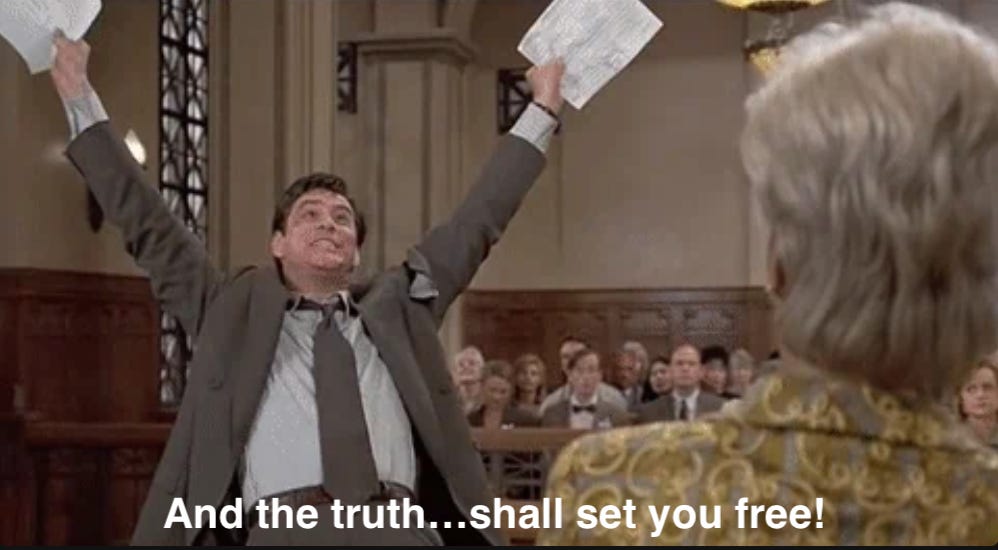How often have you heard someone utter the phrase, “the truth shall set you free,” or some variation thereof? This popular platitude has been proffered perpetually for time immemorial. In the movie Liar Liar, Jim Carrey’s character, attorney Fletcher Reede, trumpets this trope when it is revealed that his client lied about her age to get married, freeing her from a prenuptial contract she entered into while legally a minor.
It is in like fashion that this bromide is often bandied about. It is used to convey the idea that telling the truth will free your conscience from guilt. And while there is a degree of truth to this interpretation, it is not quite accurate, as it is cut off from crucial context.
In order to properly understand this cliche, it needs to be read with its surrounding text. First, let’s look at the the full quote:
So Jesus was saying to those Jews who had believed Him, “If you continue in My word, then you are truly disciples of Mine; and you will know the truth, and the truth will make you free.”
John 8:31-32
Yes, these words originated with Jesus. Here we have Him telling some Jews who were following Him that, when they came to know the truth, they would be free. What truth? Free of what? At this point, it may still seem that the common use is accurate.
Let’s bring in more of the context:
They answered Him, “We are Abraham’s descendants and have never yet been enslaved to anyone; how is it that You say, ‘You will become free’?”
Jesus answered them, “Truly, truly, I say to you, everyone who commits sin is the slave of sin.
John 8:33-34
Ah, here is some clarification! Knowing the truth will set us free from sin. You see, those with whom Jesus spoke, much like people today, could not perceive their own enslavement. They believed they were, and always had been, free, failing to recognize that they were sinners in need of salvation, in need of being released from their bondage to sinful behavior.
But that still leaves the question, what is this truth that can provide such freedom? What were they missing that would provide the key to their liberation? Jesus informs them:
The slave does not remain in the house forever; the son does remain forever. So if the Son makes you free, you will be free indeed.
John 8:35-36
And there it is - the Son makes us free. Wait…how is that “truth”? This is more often than not overlooked, because people think of truth as some factual information, some concept or idea that can be proven. While there is such truth, that is not the truth that sets us free.
Jesus said to him, “I am the way, and the truth, and the life; no one comes to the Father but through Me.
John 14:6
The truth is a person. It is not words or facts - it is Jesus Himself. The Son of God. Knowing Him is knowing the Truth that is able to set us free. He frees our conscience, He frees us from our enslavement to our earthly entanglements, He frees us from sin.
Receive Jesus. Get to know Him. Spend time with Him. Allow Him to live through you. And then you will be truly free.
I have been crucified with Christ; and it is no longer I who live, but Christ lives in me; and the life which I now live in the flesh I live by faith in the Son of God, who loved me and gave Himself up for me.
- Galatians 2:20



I am currently in a study on redemption and this goes along those lines. What was it that the Jews were looking for in the Messiah when Jesus walked on the scene? They were looking for the Messiah to redeem them from oppressive Roman rule. Jesus, understanding Moses role in God's redemption of Israel through the exodus out of Egypt and the subsequent journey through the wilderness and eventually into the promised land saw a greater power than Rome operating behind the scene, the power of sin and death, those spiritual forces Paul talks about in Ephesians. And it was this Egypt / Babylon / Rome that He came to "set us free from."
Thanks for the thought provoking post.
What a great conversation – thank you for chewing the cud, Chad!
“Jesus said to him, ‘I am the way, and the truth, and the life; no one comes to the Father but through Me.’”
I have asked so many priests about this line, b/c on the surface it seems to mean Jesus (or Christianity) is the only Way to God, the Father. But what about all those people who have never been exposed to Christianity, never read the bible – or who can’t even read? What about those good people before Christ? How can God, who loves us unconditionally, penalize anyone to an eternity in hell, but especially those who never could even read or have that idea floated to them?
The best answer I got was from Father Carney, who said, “Remember the “I AM” statement from Moses and Jesus. (Me: Uh, maybe but I need to read the bible better.) He said, God is within us all – and Jesus said for us to Love God, and Love Others and through our imitation of Christ, we can ignite that spark and be our own version of Jesus (God) and that is the Way, the Truth and the Life. And I liked that answer. It works for me.
But, I also ask how could our God, who love us unconditionally, penalize us to go to hell? That doesn’t make sense, which led me to ask why did the Church cancel Origen of Alexandria in the 6th century? https://lizlasorte.substack.com/p/why-was-origen-of-alexandria-canceled?r=76q58